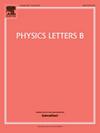Bayesian constraints on covariant density functional equations of state of compact stars with new NICER mass-radius measurements
IF 4.3
2区 物理与天体物理
Q1 ASTRONOMY & ASTROPHYSICS
引用次数: 0
Abstract
Recent advancements in astrophysical observations of compact stars, particularly the new and updated NICER constraints, have provided mass-radius (M-R) data for pulsars spanning masses from 1 to . These data offer a unique opportunity to test modern theories of dense matter using multi-messenger constraints. Covariant density functional (CDF) models of nuclear matter, which capture a broad range of nuclear and astrophysical phenomena, provide a robust theoretical framework to interpret these observations. This study applies the Bayesian framework to a class of CDF models with density-dependent meson-nucleon couplings, specifically those based on nucleonic degrees of freedom. By incorporating the latest multi-messenger constraints, we impose tighter limits on the parameter space of these models and assess their consistency with observational data. Our analysis advances previous efforts by refining the density-dependence parameterization and integrating recent M-R ellipses. This enables more stringent evaluations of dense matter models in light of new astrophysical observations.
基于新的NICER质量半径测量的致密恒星协变密度泛函方程的贝叶斯约束
致密恒星的天体物理观测的最新进展,特别是新的和更新的NICER约束,为脉冲星提供了质量从1到2M⊙的质量半径(M-R)数据。这些数据提供了一个独特的机会来测试使用多信使约束的致密物质的现代理论。核物质的协变密度泛函(CDF)模型捕获了广泛的核和天体物理现象,为解释这些观测结果提供了一个强大的理论框架。本研究将贝叶斯框架应用于一类具有密度依赖介子-核子耦合的CDF模型,特别是那些基于核子自由度的模型。通过结合最新的多信使约束,我们对这些模型的参数空间施加了更严格的限制,并评估了它们与观测数据的一致性。我们的分析通过改进密度相关的参数化和整合最近的M-R椭圆推进了先前的努力。这使得根据新的天体物理观测对致密物质模型进行更严格的评估成为可能。
本文章由计算机程序翻译,如有差异,请以英文原文为准。
求助全文
约1分钟内获得全文
求助全文
来源期刊

Physics Letters B
物理-物理:综合
CiteScore
9.10
自引率
6.80%
发文量
647
审稿时长
3 months
期刊介绍:
Physics Letters B ensures the rapid publication of important new results in particle physics, nuclear physics and cosmology. Specialized editors are responsible for contributions in experimental nuclear physics, theoretical nuclear physics, experimental high-energy physics, theoretical high-energy physics, and astrophysics.
 求助内容:
求助内容: 应助结果提醒方式:
应助结果提醒方式:


